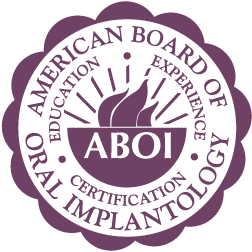Advanced Periodontitis: A Serious Gum Disease
Advanced periodontitis is a severe form of gum disease that can lead to significant tooth damage and loss if left untreated. It occurs when the bacteria that cause gum disease have spread to the deeper structures supporting the teeth.
Our Havre de Grace, MD dentist recommends seeking immediate treatment if you notice any signs of periodontitis to prevent further complications. Call (410) 939-5800 to learn more.
Understanding Advanced Periodontitis
Advanced periodontitis is characterized by the breakdown of the bone and tissue that support the teeth. This damage is caused by a buildup of plaque and tartar, which can harden and irritate the gums. Over time, the infection can spread to the underlying bone and tissue, leading to tooth loosening and eventual loss.
Symptoms of Advanced Periodontal Disease
- Gum recession: Gums pulling away from the teeth, exposing the roots.
- Gum inflammation: Red, swollen, and tender gums that may bleed easily.
- Gum pocket formation: Deep pockets between the teeth and gums that trap bacteria.
- Bad breath: Persistent bad breath that doesn’t improve with oral hygiene.
- Tooth mobility: Loose or shifting teeth.
- Pain or discomfort: Pain or discomfort while chewing or applying pressure to the teeth.
- Abscess formation: Pus-filled pockets between the teeth and gums.
- Changes in bite: An uneven or uncomfortable bite due to tooth shifting.
- Gum ulceration: Open sores or ulcers on the gums.
Treatment Options for Advanced Periodontitis
Periodontal Surgery
In some cases, surgical intervention may be necessary to treat advanced periodontal disease. Procedures such as flap surgery, bone grafting, or guided tissue regeneration may be performed to access deeper areas of infection, remove diseased tissue, and promote tissue regeneration and healthy bone growth.
Laser Therapy
Laser-assisted periodontal therapy is an alternative to traditional surgery. It involves using a dental laser to remove diseased tissue and bacteria while promoting gum tissue regeneration.
Antibiotic Therapy
In some cases of severe gum disease, oral antibiotics may be prescribed to help control the gum infection. They can be taken orally or applied directly to the infected areas, such as in antimicrobial mouth rinses or gels.
Scaling and Root Planing
Scaling and root planing is a deep cleaning procedure performed by a dental professional. It involves removing plaque and tartar buildup from above and below the gum line (scaling) and smoothing the tooth roots to eliminate bacterial toxins (root planing). This procedure helps remove the source of infection and promotes the healing of the gums.
Ongoing Maintenance and Periodontal Maintenance Therapy
After an initial periodontal treatment, regular follow-up visits with a dental professional are crucial. These visits typically include professional cleanings and ongoing monitoring of gum health to prevent the recurrence or progression of periodontal disease.
 Improving Oral Hygiene
Improving Oral Hygiene
Good oral hygiene practices at home are essential for managing advanced periodontal disease. This includes regular brushing and flossing, with antibacterial mouth rinses, and incorporating interdental cleaning tools such as dental picks or water flossers to effectively remove plaque and bacteria from the gum line and between teeth.
The Impact of Advanced Periodontitis
Advanced periodontitis can have a significant impact on your overall health and well-being. In addition to tooth loss, it can lead to:
- Increased risk of heart disease: Studies have shown a link between gum disease and heart disease.
- Increased risk of stroke: Gum disease can increase the risk of blood clots, which can lead to stroke.
- Increased risk of diabetes: People with diabetes are more likely to develop gum disease, and vice versa.
- Low birth weight and preterm birth: Gum disease during pregnancy has been linked to an increased risk of low birth weight and preterm birth.
Advanced Periodontitis Prevention
- Good oral hygiene: Regular brushing, flossing, and using mouthwash.
- Regular dental checkups: Routine dental exams and cleanings.
- Quitting smoking: Smoking is a major risk factor for gum disease.
- Healthy diet: A diet rich in fruits, and vegetables, and low in sugar.
- Stress management: Managing stress can help boost your immune system.
If you’re experiencing any symptoms of advanced periodontitis, please contact our Havre de Grace, MD dental office at (410) 939-5800 to schedule an appointment. Early treatment is essential to prevent further damage and complications.
Frequently Asked Questions
What causes advanced periodontitis?
How is advanced periodontitis treated?
The treatment for advanced periodontitis will depend on the severity of the infection and the extent of the damage to your teeth and gums. In most cases, treatment may involve a combination of professional cleanings, medications, and surgery.
What are the long-term consequences of advanced periodontitis?
Advanced periodontitis can lead to tooth loss, bone loss, and other serious health problems if left untreated. It’s important to seek treatment for severe periodontitis as soon as possible to prevent further damage to your teeth and gums.
Schedule an Appointment at our Havre de Grace, MD Dental Office Today
If you’re experiencing any symptoms of advanced periodontitis, don’t wait to seek treatment. Early treatment is essential for preventing further damage and long-term consequences, so don’t hesitate to take action and prioritize your oral health.
Contact our Havre de Grace, MD office by calling (410) 939-5800 or by filling out our online contact form. Dr. Grubb and our team proudly welcome patients who reside near the Havre de Grace Heights, Bayview Estates, and Osborne area.




